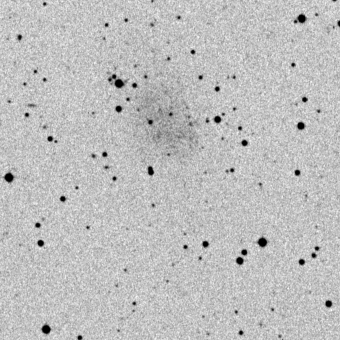The Antlia Dwarf Galaxy
 On the original sky survey plate Antlia looks
like a fuzzy low surface brightness patch some 3mm (= 3 arcmin) in diameter.
This appearance is characteristic of potential new Local Group galaxies
and a whole host of interlopers such as: planetary nebulae, Galactic
reflection nebulosity and distant low surface brightness galaxies.
Occassionally galaxies just outside the Local Group like the newly
discovered Argo dwarf galaxy also turn up.
On the original sky survey plate Antlia looks
like a fuzzy low surface brightness patch some 3mm (= 3 arcmin) in diameter.
This appearance is characteristic of potential new Local Group galaxies
and a whole host of interlopers such as: planetary nebulae, Galactic
reflection nebulosity and distant low surface brightness galaxies.
Occassionally galaxies just outside the Local Group like the newly
discovered Argo dwarf galaxy also turn up.
The new Antlia dwarf galaxy seems to be similar to other dwarf spheroidal
galaxies. The brightest stars are easily resolved and the galaxy appears
quite smooth and devoid of any obvious concentrations of stars or possible
clusters. A deep H_alpha image reveals no obvious star forming regions
and there are no young hot blue stars apparent in any of the deep CCD
images taken. The distribution of the colours and magnitudes of stars visible
is typical of the Milky Way satellite dwarf spheroidals and comparison with
these and other nearby galaxies lead us to conclude that the distance of Antlia
is close to 1 Mpc. It is most similar in appearance to the Tucana dwarf,
the only other isolated Local Group dwarf spheroidal galaxy known. At a
distance of 1 Mpc the apparent size of Antlia on the deep CCD images suggests
that it is only 1-2 kpc in diameter and probably only contains a million or
so stars placing it firmly at the faint end of the galaxy luminosity
function.
The Antlia dwarf is a very intriguing object. It is similar
to the extreme dwarf spheroidals orbiting the Milky Way and Andromeda, and
yet is relatively isolated in the Local Group. Being far away from the two
large Local Group galaxies, Antlia will provide interesting constraints
on the age and total mass of the Local Group by means of the ``timing
argument''. According to Big-Bang cosmologies all the members of the Local
Group were born close together in space but with sizeable relative velocities.
Knowing their present distances and velocities and the masses of the
larger members makes it possible to work backwards and decide how old the
Universe is independently of knowledge of Ho.
Return to previous page
Return to constellation antila
 On the original sky survey plate Antlia looks
like a fuzzy low surface brightness patch some 3mm (= 3 arcmin) in diameter.
This appearance is characteristic of potential new Local Group galaxies
and a whole host of interlopers such as: planetary nebulae, Galactic
reflection nebulosity and distant low surface brightness galaxies.
Occassionally galaxies just outside the Local Group like the newly
discovered Argo dwarf galaxy also turn up.
On the original sky survey plate Antlia looks
like a fuzzy low surface brightness patch some 3mm (= 3 arcmin) in diameter.
This appearance is characteristic of potential new Local Group galaxies
and a whole host of interlopers such as: planetary nebulae, Galactic
reflection nebulosity and distant low surface brightness galaxies.
Occassionally galaxies just outside the Local Group like the newly
discovered Argo dwarf galaxy also turn up.